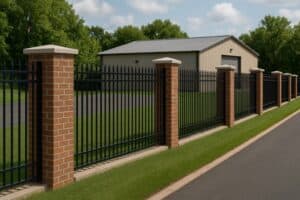
Table of Contents
- What Makes a Commercial Fence “High-Quality”?
- Top Advantages for Business Properties
- Security: The First Line of Defense
- Cost-Efficiency Over Time
- Improving Privacy and Brand Experience
- Common Materials and Their Benefits
- Legal, Insurance, and Liability Factors
- Professional Installation Versus DIY
- Keeping Your Investment in Top Shape
What Makes a Commercial Fence “High-Quality”?
When planning improvements to any business property, investing in a high-quality commercial fence is a decision with long-lasting impact. A quality fence goes well beyond its role as a simple divider. It features expert craftsmanship, utilizes tested and resilient materials, and employs a methodical installation process that adheres to both industry best practices and stringent safety protocols. An actual high-quality fence incorporates functionality, safety, and visual appeal. Those researching the right provider often look for specialists in the field, such as those from reputable manufacturers or trusted local experts, who offer a commercial fence Austin. Working with such professionals sets a business up for optimal results.
Standout fences are built from premium-grade steel, high-strength aluminum, durable vinyl, or fortified wood composites. These options are engineered to weather harsh sunlight, heavy storms, or day-to-day wear, and often include special coatings or finishes that extend longevity. Other hallmarks of a high-quality fence include firm, stainless steel fasteners and well-anchored posts. Being attentive to modern industry standards, such as proper wind resistance, safe gate mechanisms, and applicable warranties, is crucial. The best fences remain reliable and attractive for decades with minimal intervention.
Top Advantages for Business Properties
Businesses of every kind benefit from installing a sturdy, reliable fence around their property. One of the most widely recognized advantages is improved security, but that’s just the start. An effective fence helps prevent break-ins, minimize liability, and protect valuable inventory, equipment, or confidential areas. Companies like Northwest Fence & Iron Austin specialize in providing high-quality fencing solutions tailored to commercial needs, helping businesses enhance both safety and curb appeal. Property owners also notice a positive shift in their space’s professional appearance—first impressions matter, after all, and an orderly, attractive boundary can set the tone for business relationships and customer trust before visitors step inside.
- Security: High-quality fencing acts as both a physical and psychological deterrent. Intruders and vandals are far less likely to target a property that appears secure.
- Aesthetics: A well-designed fence can highlight the unique style of an office complex, warehouse, or industrial site, making the grounds more inviting and underscoring the company’s attention to detail.
- Compliance: For businesses in sectors such as healthcare, primary education, or those handling hazardous materials, fencing is often a matter of legal necessity.
Attractive, compliant fencing can also help establish and maintain positive relationships with neighboring businesses and the surrounding community by clearly defining property boundaries and minimizing disputes.
Security: The First Line of Defense
Fences serve as a property’s primary shield against crime. According to several urban safety studies, facilities surrounded by robust, locked, and well-maintained fencing experience a decrease of up to 25% in opportunistic crime compared to similar properties left unprotected. Even a few visible security upgrades—such as anti-climb rails or motion-detecting lights—can increase the difficulty of unauthorized entry, discouraging would-be intruders from perceiving your business as an easy target. As noted in Security Magazine, steel fencing in particular plays a vital role in perimeter protection, offering 24/7 security that is both durable and difficult to breach.
In real-world terms, warehouses, distribution centers, or corporate campuses with strong commercial fencing are less vulnerable to vandalism or theft. The peace of mind this security brings translates directly to higher employee morale, improved safety, and the ability to focus on core business operations without worry. Security-conscious property owners also find it easier to qualify for insurance coverage, which can sometimes result in reduced premiums.
Cost-Efficiency Over Time
Though the upfront costs for a premium fence may be higher than those for simple alternatives, the long-term financial benefits are undeniable. Heavy-duty materials, expert workmanship, and proper installation result in fewer repairs and less frequent replacements throughout the fence’s lifespan. Some research indicates that businesses investing in weather-resilient or rust-proof fencing options can achieve annual savings of up to 40% on repairs and maintenance.
Cutting corners on quality often leads to repeated headaches, including warped posts, sagging panels, constant repairs, and interruptions to business operations. A low-quality fence can quickly require costly remediation or, worse, total replacement long before its expected lifespan is up. In the business world, a well-chosen, high-quality fence quickly proves itself as a prudent financial decision.
Improving Privacy and Brand Experience
A well-planned fence doesn’t just keep unwanted visitors out—it makes clients and staff feel more comfortable and protected within. For offices situated near busy thoroughfares or for facilities handling confidential operations, fencing can help create secluded, serene outdoor areas. The ability to shield areas such as loading docks, employee patios, or storage yards from public view allows employees to work, take breaks, or collaborate in greater confidence.
Fencing can also play a significant role in brand presence. Careful selection of materials, colors, and design can reinforce both subtle and direct elements of a company’s identity, making the site instantly recognizable. Even modest design details, such as logo panels or color-matched finishes, contribute to a cohesive brand story that begins at the gate.
Common Materials and Their Benefits
No single fencing material is perfect for every scenario, but understanding the advantages available can help business owners make informed choices. Modern commercial fences are commonly built from ornamental steel for unmatched strength and minimal maintenance, chain-link for excellent visibility and value, aluminum for corrosion resistance and a polished appearance, or wood and composite options for superior privacy and flexibility in design.
- Ornamental Steel: Ideal for high-security applications or locations that require elegance.
- Chain-Link: Practical for properties prioritizing visibility or budget constraints.
- Aluminum: Ideal in humid or rainy regions where rust is a concern.
- Wood/Composite: Best suited for areas where visual privacy and custom design are top priorities, but they do require regular care.
Legal, Insurance, and Liability Factors
Most business owners are surprised to learn about the numerous local laws that apply to commercial fencing. Regulations may dictate maximum heights, minimum set-backs from streets, or the exact materials allowed near commercial zones. These laws are not just bureaucratic details—they directly affect safety, accessibility, and liability. Non-compliance can result in expensive fines, legal battles, or even forced removal, each of which can significantly disrupt a business.
On the insurance side, documented security enhancements, such as quality fencing, may make it easier to obtain coverage or unlock discounts by reducing the risk of claims related to theft or accidents. Consulting local authorities and your insurance agent before breaking ground will help ensure your investment delivers the best results.
Professional Installation Versus DIY
While do-it-yourself projects are popular for smaller residential jobs, a commercial fence is a technical undertaking that is best left to experienced professionals. Qualified installers have up-to-date knowledge of local building codes, proper permitting processes, and advanced construction methods. This expertise ensures everything from sturdy post depth to seamless gate alignment and electrical integration if needed.
Mistakes during a self-installation can lead to costly repairs, regulatory issues, and even voided warranties. Professional installation is an investment in both immediate quality and long-term reliability.
Keeping Your Investment in Top Shape
To make the most of your fence’s long life, commit to a regular inspection and maintenance routine. Preventive care is straightforward and saves money by catching minor issues before they become expensive repairs. Owners should study a detailed inspection checklist and set reminders to review their fence several times a year. Look for bent posts, loose fasteners, rust spots, damaged panels, gate misalignment, or obstructing vegetation.
- Inspect the complete fence line at least twice a year to spot issues early.
- Lubricate hinges, locks, and moving parts to guarantee dependable operation.
- Wash or power clean surfaces as needed to remove buildup and prevent corrosion or decay.
- Promptly address cracked paint, loose bolts, or minor damage.
Property owners can find practical routine inspection checklists from leading home and landscaping experts—resources like these enable anyone to keep their fencing investment looking sharp and functioning as intended.
In summary, a high-quality commercial fence is a wise investment with far-reaching advantages. It brings peace of mind, strengthens business assets, enhances branding, and ensures property safety and compliance for years to come.




